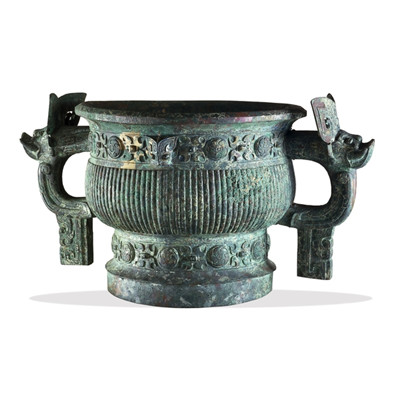Here in the west, we have the concept of democracy, and in China it's the Mandate of Heaven.
它內在的圖騰含義相當于西方的民主概念。
For example, you can see if you offend the heaven, or offend the people, then you will see the omens from heaven - thunder, rain, earthquake.
在中國,如果你觸犯了神靈,或違背了民心,就會有兇兆預警—雷電、暴雨或地震。
That's why every single time that China has an earthquake, the political rulers were scared, because they were reading that as some kind of Mandate of Heaven.
中國的每一次地震都讓當權者恐懼,因為他們將其看作違抗天命的后果。
So the Zhou's ritual feasting with vessels like our gui was in part a public assertion that the gods endorsed the new regime.
本節中這樣的簋在中國各地都有出土,
Gui such as ours have been found over a wide swathe of China, because the Zhou conquest continued to expand until it covered nearly twice the area of the old Shang kingdom.
因為周朝繼續征戰,最后的統治面積達到了商朝的兩倍。
It was a cumbersome state, with fluctuating levels of territorial control.
這是一個過于龐大的國家,領土面積不斷波動。
But nonetheless, the Zhou Dynasty lasted for as long as the Roman Empire, and indeed longer than any other dynasty in Chinese history.
但它的統治期仍相當于羅馬帝國,是中國歷史上存在時間最長的王朝。
And as well as the Mandate of Heaven, they bequeathed one other enduring concept to China.
除天命之外,周朝還留下了另一個影響深遠的概念。
It was the Zhou, who three thousand years ago gave to their lands the name of Zhongguo: the Middle Kingdom'.
三千年前,他們稱自己的國土為中國,意為中央的國度。
And the Chinese have thought of themselves as the Middle Kingdom, placed in the very centre of the world, ever since.
此后中國人一直將自己看作世界的中心。












